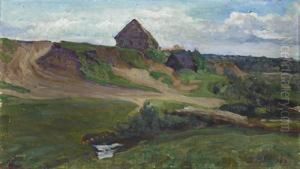Vassily Nikitich Meshkov Paintings
Vassily Nikitich Meshkov, born in 1867 and passing in 1914, was a notable figure in the realm of Russian painting, whose life and career unfolded during a period of significant transformation in the Russian Empire. Meshkov's artistry was nurtured in an era marked by rapid social changes and the stirrings of modernist movements that would eventually reshape the cultural landscape of the early 20th century. Despite the relatively brief span of his life, Meshkov's contributions to Russian art were profound, reflecting the nuanced interplay between traditional aesthetics and the burgeoning influences of European modernism.
Meshkov's educational journey in art began at the esteemed Moscow School of Painting, Sculpture and Architecture, a crucible for many artists who would go on to shape Russian art and culture. Here, Meshkov honed his skills and absorbed the rich tapestry of artistic influences that the institution was known for, ranging from classical Russian to emerging European styles. His early works showcased a mastery of form and color, imbued with a distinct sensitivity to the natural world and the human condition, themes that would remain central to his oeuvre.
As Meshkov's style evolved, so too did his engagement with the broader currents of European art. He traveled extensively, drawing inspiration from the Impressionists and Post-Impressionists, whose emphasis on light and color deeply influenced his approach to landscape and portraiture. Meshkov's paintings from this period are characterized by their vibrant palette and dynamic brushwork, marking a departure from the more reserved tones of his earlier work.
Despite his alignment with progressive artistic trends, Meshkov remained deeply connected to the Russian landscape and its people. His works often depicted rural scenes and everyday life, infused with a sense of immediacy and emotional depth. This duality – a commitment to avant-garde principles while remaining rooted in the Russian experience – defined Meshkov's contribution to the art world.
Meshkov's career was tragically cut short by his untimely death in 1914, just as the world stood on the brink of the First World War. His passing marked the loss of a significant voice in Russian art, one that had bridged the gap between the old and the new. Today, Meshkov's legacy is preserved in the collections of major Russian museums, where his works continue to be celebrated for their unique blend of traditional and modernist sensibilities. Through his art, Meshkov remains a testament to the vibrant cultural ferment of his time, capturing the spirit of a nation at the crossroads of change.
